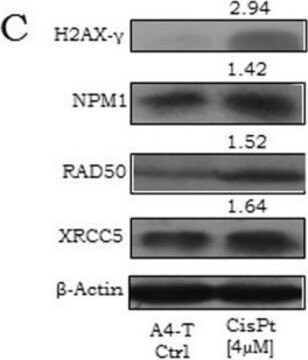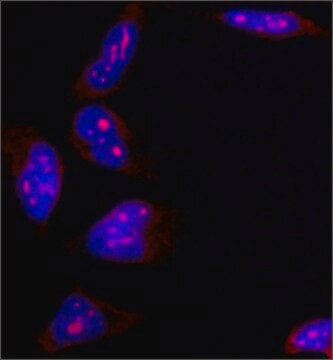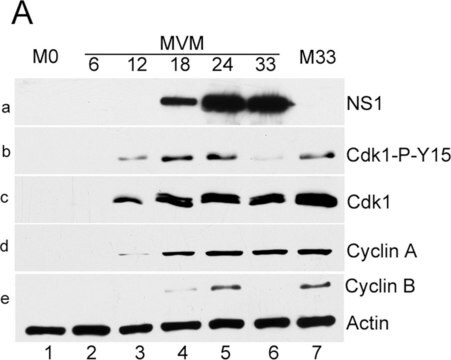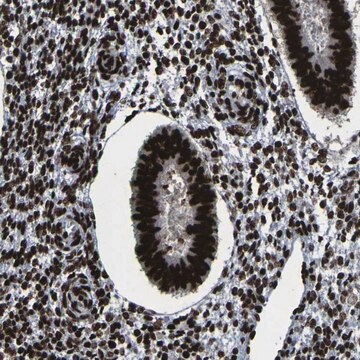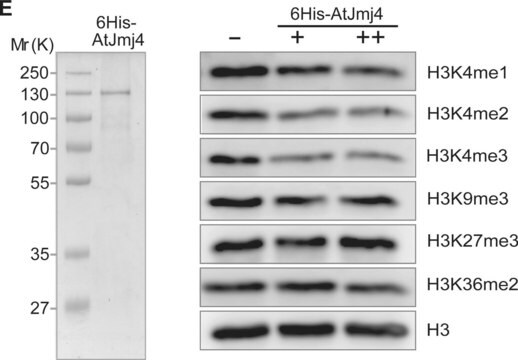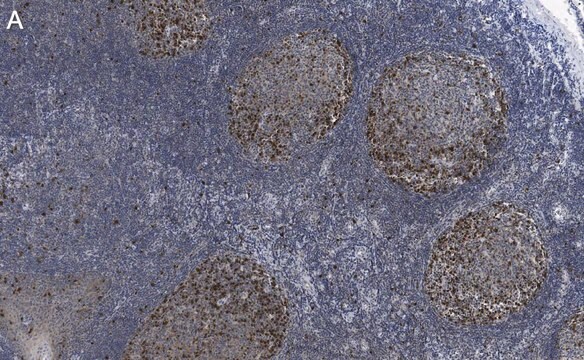ZRB1322
Anti-NPM/B23 Antibody, clone 2H21 ZooMAb® Rabbit Monoclonal

recombinant, expressed in HEK 293 cells
Sinonimo/i:
Nucleophosmin;Nucleolar phosphoprotein B23;Nucleolar protein NO38;Numatrin)
About This Item
Prodotti consigliati
Origine biologica
rabbit
Livello qualitativo
Ricombinante
expressed in HEK 293 cells
Coniugato
unconjugated
Forma dell’anticorpo
purified antibody
Tipo di anticorpo
primary antibodies
Clone
2H21, recombinant monoclonal
Descrizione
recombinant, expressed in HEK 293 cells
Nome Commerciale
ZooMAb® learn more
Stato
lyophilized
PM
calculated mol wt 32.58 kDa
observed mol wt ~36 kDa
Purificato mediante
using Protein A
Reattività contro le specie
rat, human
Reattività contro le specie (prevista in base all’omologia)
bovine, monkey, porcine, canine, feline, mouse
Confezionamento
antibody small pack of 25 μL
Caratteristiche più verdi
Waste Prevention
Designing Safer Chemicals
Design for Energy Efficiency
Learn more about the Principles of Green Chemistry.
Convalida avanzata
recombinant expression
Learn more about Antibody Enhanced Validation
sustainability
Greener Alternative Product
tecniche
ELISA: suitable
affinity binding assay: suitable
immunocytochemistry: suitable
immunohistochemistry: suitable
western blot: suitable
Isotipo
IgG
Sequenza dell’epitopo
N-terminal
N° accesso ID proteina
N° accesso UniProt
Categoria alternativa più verde
Condizioni di spedizione
ambient
Temperatura di conservazione
2-8°C
modifica post-traduzionali bersaglio
unmodified
Informazioni sul gene
human ... NPM1(4869)
Descrizione generale
Specificità
Immunogeno
Applicazioni
Evaluated by Western Blotting in L6 cell lysates.
Western Blotting Analysis: A 1:1,000 dilution of this antibody detected NPM/B23 in L6 cell lysates.
Tested Applications
Western Blotting Analysis: A 1:1,000 dilution from a representative lot detected NPM/B23 in U2OS cell lysate.
Immunocytochemistry Analysis: A 1:100 dilution from a representative lot detected NPM/B23 in U2OS cells.
Affinity Binding Assay: A representative lot of this antibody bound NPM/B23 peptide with a KD of 5.6 x 10-7 in an affinity binding assay.
Enzyme Immunoassay (ELISA) Analysis: Various dilutions from a representative lot detected His-tagged, full-length, recombinant Human B23-NPM1 protein.
Immunohistochemistry (Paraffin) Analysis: A 1:100 dilution from a representative lot detected NPM/B23 in human colon tissue sections.
Note: Actual optimal working dilutions must be determined by end user as specimens, and experimental conditions may vary with the end user.
Descrizione del bersaglio
Stato fisico
Stoccaggio e stabilità
Note legali
Esclusione di responsabilità
Non trovi il prodotto giusto?
Prova il nostro Motore di ricerca dei prodotti.
Codice della classe di stoccaggio
11 - Combustible Solids
Classe di pericolosità dell'acqua (WGK)
WGK 1
Punto d’infiammabilità (°F)
Not applicable
Punto d’infiammabilità (°C)
Not applicable
Scegli una delle versioni più recenti:
Certificati d'analisi (COA)
Non trovi la versione di tuo interesse?
Se hai bisogno di una versione specifica, puoi cercare il certificato tramite il numero di lotto.
Possiedi già questo prodotto?
I documenti relativi ai prodotti acquistati recentemente sono disponibili nell’Archivio dei documenti.
Il team dei nostri ricercatori vanta grande esperienza in tutte le aree della ricerca quali Life Science, scienza dei materiali, sintesi chimica, cromatografia, discipline analitiche, ecc..
Contatta l'Assistenza Tecnica.